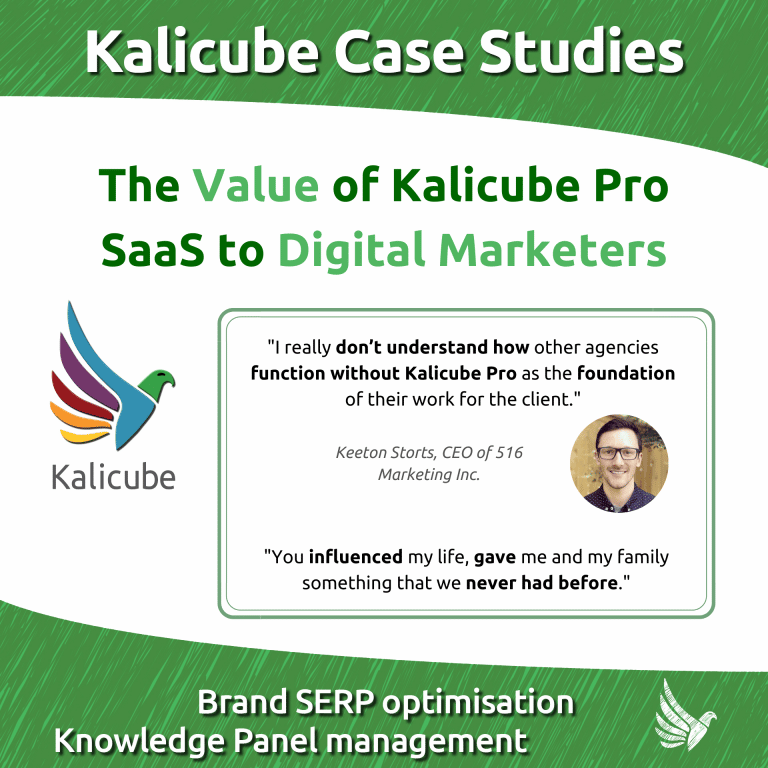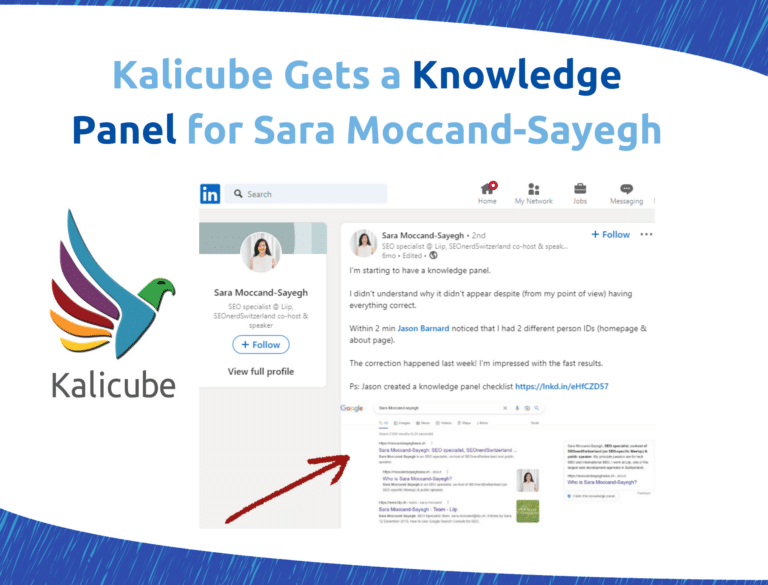E.E.A.T (Double E.A.T) for Entity SEO: What You Need to Know

What Does Google Mean by Experience, Expertise, Authoritativeness, and Trustworthiness?
E.E.A.T (or Double E-A-T) stands for Experience, Expertise, Authoritativeness, and Trustworthiness. Google takes into account multiple factors and evaluates a large number of signals to assess the credibility of the author, website owner (publisher) and content.
- Experience is demonstrable first hand experience in the topic;
- Expertise is what you say in your content. Google pays attention to whether that content is high quality, relevant and accurate;
- Authority is what peers say about the content, the publisher, or the author;
- Trustworthiness is what customers or users say about the content, the publisher, or the author.
This is an oversimplification, of course, but it’s a good way to approach your E.E.A.T work. To better understand how to build your experience, expertise, authoritativeness and trustworthiness as a person or as a brand, you can simply work to create clear signals of demonstrable proof about:
- what experience you have,
- what expert information you share,
- what your peers say about you,
- what your customers say about you.
The first huge question is “what signals is Google looking at for each element of Experience, Expertise, Authority and Trustworthiness”?
The second huge question of E.E.A.T is that it is how does Google apply those signals to its search algorithms (particularly in the context of Entity SEO)?
What are the Signals That Affect E.E.A.T in SEO?
Read more about E.E.A.T Factors in this article by Sara Moccand-Sayegh.
Just as with all Google’s algorithms, we don’t know exactly which signals and factors Google is looking at, nor their relative value. Worse, how they interact with each other, the direct or indirect “knock-on” effect of any indirect effect of any of (literally) millions of signals that the algorithms apply to those factors means that there is no real point in “chasing the algorithm” with specifics.
At Kalicube®, we opt for a holistic approach – building up thousands of small signals into a convincing whole (here are 60 simple tips to improve E.E.A.T). And, since Google’s ultimate aim is to find the content that is most relevant and helpful to its users, thinking in terms of what signals will convince your audience is a great approach.
Always bear in mind that, in SEO you are building a case for yourself – why should Google trust you to provide the solution to its user’s problem?
Experience
Some direct signals Google looks at for evaluating Experience are the content itself (for example a unique, detailed analysis, a video demonstration of a product or a talk on the topic), educational qualifications, industry events, awards and certifications.
Expertise
Some direct signals Google looks at for evaluating Expertise are the quality of your website, the quality of your content, whether what you say in your content is in line with the general opinion on the industry and whether your audience appreciates your content. This content can be on your website or on your social media platforms or in your responses on review platforms to your customers’ reviews. In fact, any content that Google can easily associate with your brand or yourself online on your website or off your website.
Authoritativeness
Some direct signals Google looks at for evaluating Authoritativeness are things like inbound links from authoritative sources in your industry, either from influential or important publications or relevant websites. So an inbound link from the New York Times would always be a great signal of authority, but a highly relevant website that is authoritative in the industry is better. For example, if I were a dentist, a link from the New York Dental Association would be even more valuable because it’s relevant. Also, it matters if your peers comment on your content or if they share your content on social media, or mention the person, the company or cite the content in their publications with or without a link. Profile pages on authoritative, human curated sites are also powerful: Muckrack for authors, Forbes for companies…
Trustworthiness
Some direct signals Google looks at for evaluating Trustworthiness are customer reviews, customer comments on your web pages, customer interaction with your posts on social media (including YouTube, Twitter, Facebook), user comments on forums and so on and so forth. In short, any user feedback about your service, your company or yourself that proves your credibility in the eyes of your users or customers.
With the December 2022 update to the Quality Rater Guidelines, Trustworthiness takes an additional central role – without Experience, Expertise and Authoritativeness, there is no trust (even if your clients demonstrably love you).
Pro tip: data shows that Google is also assessing Notability and Transparency, so at Kalicube we work on N.E.E.A.T.T
At What Levels is E.E.A.T Measured by Google?
Google measures Expertise, Authoritativeness, and Trustworthiness at three levels. It measures them at these levels:
- content;
- author / content creator;
- publisher (person or company).
To apply the E.E.A.T signals mentioned above, Google needs to understand:
Content
Which problem does the content solve? Does the content demonstrate relevant experience for this specific problem? Does the content provide the best solution (or answer) that will help Google’s user efficiently and effectively.
Author / Content Creator
Who wrote / scripted / created / presents the content? Does the person have relevant experience in this topic, are they an expert, are they authoritative for this topic and does their audience trust them?
Website Owner (Publisher)
Which company or person published the content (solution or answer)? Do they have relevant experience, expertise, authoritativeness and do their audience trust them?
Ideally, expertise, authority and trustworthiness are demonstrated at page level, author level, and at publisher/brand level (see the table below for more details).
Always bear in mind that the aim of SEO is to convince Google to trust you to provide the solution to its user’s problem
Jason Barnard
How does Google Apply E.E.A.T Signals in Search?
Google has multiple algorithms that create the different elements in a SERP: blue links, Video Boxes, Carousels, Map Packs, Featured Snippets, Knowledge Panels, News Boxes, Entity Boxes etc etc. E.E.A.T signals are used for each and every one of these algorithms to a greater or lesser degree. News results rely on E-E-A-T more than Video Boxes, for example.
It will also apply E.E.A.T signals differently depending on the topicality and industry. Sensitive topics such as medical or dietary advice will rely more heavily on E.E.A.T signals than humour and comedy.
Read more about E.E.A.T Signals in this article by Sara Moccand-Sayegh
Entity SEO and E.E.A.T
If Google explicitly understands who the author and publisher of the content is, then it can judge their experience, expertise, authoritativeness and trustworthiness reliably and can therefore fully apply E.E.A.T signals.
Explicit understanding means being an entity in Google’s Knowledge Vault. That is Entity SEO.
At Kalicube we have added thousands of entities to Google’s Knowledge Graph.
But what if your entity (author or publisher) isn’t in the Knowledge Vault? If Google hasn’t explicitly understood, then any E.E.A.T signals it applies in the algorithms are guesswork, less reliable and will therefore have less influence on rankings.
When you are an entity in the Knowledge Vault, then all the work you have done to create positive E.E.A.T signals for your company, authors and content will take full effect, and for the same work the payback will be much higher.
Google’s Explicit Understanding of Your Entity is Key to E.E.A.T.
One way to determine if Google has explicitly and confidently understood a person, company or other entity is to look at Google’s Knowledge Graph or a Knowledge Panel on the Brand SERP for that entity. This explicit understanding is a huge E.E.A.T (and therefore rankings) boost.
But Google is also capable of guessing an entity from the text on your web page: Although it does not explicitly understand the entity from the perspective of the Knowledge Graph or Knowledge Panel, it can guess the entity from the the context of the content. However, in this case, Google can only partially apply your E.E.A.T signals and rankings will suffer.
Improving your E.E.A.T can have a significant impact on your search engine ranking. Google has stated that E.E.A.T is a key factor in determining the quality of a piece of content, and that high-quality content is more likely to rank well in search results. The best way to determine if Google understands you, trusts you, and considers you authoritative is to search for your own name and look at your Brand SERP and Knowledge Panel results to see if they match what you think is right.
The December 2022 Update to E.E.A.T (or Double-E-A-T)
In December 2022, Google added a new element to its quality rating guidelines… E-A-T became E.E.A.T or “Double E-A-T,” which stands for Experience, Expertise, Authoritativeness and Trustworthiness. The guidelines now emphasise that content should demonstrate “Experience,” meaning that authors have first-hand experience of what they are writing about.
“E.E.A.T - or “Double-E-A-T,” if you prefer, is now part of the updated search rater guidelines we’ve just released. You’ll also see clearer guidance throughout the guidelines underscoring the importance of content created to be original and helpful for people, and explaining that helpful information can come in a variety of different formats and from a range of sources.”
Google Search Central Blog, 1
With the December 2022 update, Google now states that Trust is at the centre of this concept. They use it to describe the cumulation of Experience, Expertise and Authority. So a piece of content that demonstrates the experience of the author and publisher, their expertise (knowledgeability) and that they are a leading authority in the industry, become trusted.

Kalicube’s Simple Table of E.E.A.T
| Content | Author | Publisher | |
| Experience | Demonstrates direct experience of the topic and original, first hand information. | Has first-hand or life experience for the topic. | Has visible, historical, recognised involvement in the topic. |
| Expertise | Is in line with generally industry-accepted facts on the topic. Provides an understandable solution to the problem / answer to the question. | Has written multiple articles on the topic (or closely related topics) on industry-authoritative websites. | Provides topical content that is in line with generally industry-accepted facts across owned sites, social platforms and third party sites. The content provides relevant solutions to common problems faced by the target audience. |
| Authoritativeness | Has multiple authoritative industry-relevant backlinks. Is consistently shared on the web by peers in a positive context. | Is regularly cited by peers in a positive context. Has mentions and links back to their Entity Home from multiple relevant authoritative websites. | Is regularly cited by industry peers in a positive context. Has mentions and links back to their Entity Home from multiple relevant authoritative websites. |
| Trustworthiness | Has positive user generated comments or reviews in the page. Is consistently shared on the web by the relevant audience in a positive context. | Is regularly tagged and positively cited on sites, in user generated comments and social media by the industry audience. | Has positive service reviews on multiple trusted platforms. Is regularly cited in a positive manner by the target audience (clients and users) on forums, and across the web. |

Further Reading in E.E.A.T and Double-E-A-T
You can further your understanding about E.E.A.Tin SEO with the resources listed below:
- listen to this podcast episode with Jason Barnard (The Brand SERP Guy®) with Lily Ray: E-A-T, the how, the why and the what to do.
- watch this Kalicube Knowledge Nugget with Slobodan Manic: How E-A-T Signals are Affected by Google’s Understanding of the Entity.
- read this article by Sara Moccand-Sayegh about E.E.A.T Signals.
How does E.E.A.T Fit into Brand SERP Optimisation and Knowledge Panel Management?
As mentioned earlier, once Google understands who you are, it can easily and reliably apply the E.E.A.Tsignals. If Google explicitly and confidently knows who published the content and who authored the content, then it can apply those E.E.A.T signals. If it does not, it will have to guess when applying the E.E.A.T signals, meaning it will be less confident and the strength of the signals will be dampened.
If you have a Knowledge Panel in your Brand SERP (what your audience sees when they google your personal name or brand name), that’s a clear signal that Google understands who you are, what you do, and which audience you serve, and therefore can confidently and fully apply the E.E.A.T signals.
If you do not have a Knowledge Panel, then you can look at the Left Rail of the Brand SERP to see how well Google is guessing. The accuracy of the Left Rail of your Brand SERP gives you an indication of both how close you are to getting a Knowledge Panel and also how fully Google is likely to be fully applying your E.E.A.T signals.
So analysing and measuring your Brand SERP is a KPI you can use for the understanding Google has of your entity, and thus its ability to fully apply the E.E.A.T signals you work so hard to achieve.





